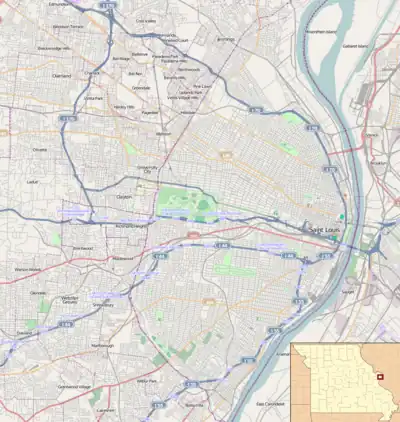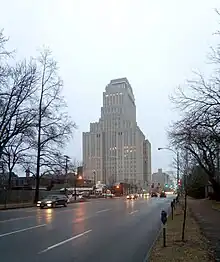Chase Park Plaza Hotel
The Chase Park Plaza Royal Sonesta St. Louis is a historic hotel and apartment complex located at 212 N. Kingshighway Boulevard in the Central West End, St. Louis, Missouri. It consists of two buildings - the Chase Hotel, built in 1922 by developer Chase Ullman,[1] and the Art Deco-style Park Plaza tower, built in 1929 and today housing condominiums. The complex also features a cinema and several restaurants and bars.[2]
| The Chase Park Plaza Royal Sonesta St. Louis | |
|---|---|
_-_panoramio.jpg.webp) The original Chase wing | |
 Location in St. Louis  Chase Park Plaza Hotel (the United States) | |
| General information | |
| Location | St. Louis, Missouri |
| Address | 212 North Kingshighway Boulevard |
| Coordinates | 38°38′39″N 90°15′50″W |
| Opening | September 29, 1922 |
| Management | Sonesta Hotels |
| Technical details | |
| Floor count | 28 |
| Design and construction | |
| Architect(s) | Preston J. Bradshaw |
| Other information | |
| Public transit access | |
History
The Chase replaced the nearby Buckingham Hotel as the most luxurious hotel in the city. The ground-floor Chase Club was a popular venue for nationally known entertainers from its opening in 1933 until it was closed in 1972.
In 1929, seven years after the Chase's opening, the rival Park Plaza was built next door. The Park Plaza's original owner, Sam Koplar, lost the Park Plaza to foreclosure during the Great Depression, but regained ownership in 1944; he became the Chase's majority owner in 1946.
The two hotels merged into the Chase-Park Plaza in 1961.[3] The Park Plaza later was converted to apartments and now is a condominium complex.
From 1989 to 1999, the Chase wing was closed. After the hotel reopened, the hyphen was dropped from the name and the property is now known as the Chase Park Plaza.
The hotel joined the Sonesta hotels chain on May 18, 2017.[4] The Chase Park Plaza is part of the National Trust for Historic Preservation's Historic Hotels of America program.
Jackie Robinson and desegregation
Jackie Robinson was a Major League Baseball (MLB) second baseman who became the first African American to play in the major leagues in the modern era. Robinson broke the baseball color line when the Brooklyn Dodgers started him at first base on April 15, 1947.[5]
In 1953, Robinson openly criticized segregated hotels and restaurants that served the Dodger organization. A number of these establishments integrated as a result, including the Chase Hotel.[6][7]
Wrestling at the Chase
The Chase was also famous for hosting a wrestling program called Wrestling at the Chase (1959–1983),[8][9] produced and televised by KPLR-TV channel 11, whose operations were in the hotel and the adjoining Park Plaza apartments, all owned by Harold Koplar, Sam Koplar's son. Many famous wrestlers, including St. Louis native Lou Thesz and Buddy Rogers, wrestled on the program.
References
- "Historic Hotels of America | Historic Hotels USA | Historic Hotel".
- O'Connor, Candace (2005). Meet Me in the Lobby: the Story of Harold Koplar and the Chase Park Plaza. St. Louis: Virginia Publishing Co. ISBN 1-891442-32-5.
- "Lost Tables: The Chase Park Plaza".
- "The Chase Park Plaza in St. Louis to Join Royal Sonesta Hotels".
- Scott Simon, Jackie Robinson and the integration of baseball (2002).
- Wormser, Richard (2002). "Jackie Robinson integrates Baseball". Public Broadcasting Service. Retrieved September 14, 2009.
- Erskine, Carl with Burton Rocks (2005). "Wait Till Next Year". What I Learned from Jackie Robinson: A Teammate's Reflections On and Off the Field. New York: McGraw-Hill. pp. 61–74. ISBN 0-07-145085-8.
- Hornbaker, Tim (2006). National Wrestling Alliance: The Untold Story of the Monopoly That Strangled Pro Wrestling. ECW Press. p. 55. ISBN 1-55022-741-6.
- Matysik, Larry (2005). Wrestling at the Chase: The Inside Story of Sam Muchnick and the Legends of Professional Wrestling. ECW Press. p. 152. ISBN 1-55022-684-3.
Gallery
- The Chase Park Plaza Hotel
 View of the Park Plaza tower wing from north on Kingshighway Boulevard
View of the Park Plaza tower wing from north on Kingshighway Boulevard